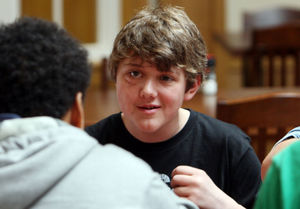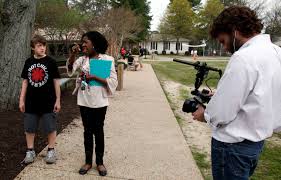Ryan's Story

As I first began the process of directing our upcoming documentary More Than Skin Deep, at times slow but always steady and satisfying, I would meet someone every so often that propelled me forward and further solidified the importance of the project. I still do. Ryan has certainly been one of those Godsends. Ryan's mother found me through social media and invited me out to speak to Ryan's school. I decided to also film the process. The results of my inspiring conversation with Ryan was a short documentary on him that shares a title with this post. His honesty, vulnerability, strength, kindness, intelligence and perseverance all stood out to me. His transition into young adulthood mirrored mine (and maybe yours) in some fundamental shared experiences between survivors of vascular anomalies. o I will detail more about the success of his short film soon. In the meantime, enjoy learning a little about Ryan. Be encouraged!
1) Describe the type of AVM you have? What was the first sign?
My AVM was at my skull base. As it grew, it destroyed
the roof of my mouth, sinuses, and a part of my right eye socket. The
first sign came just after my birth: my mom had commented that my right
cheek was slightly bulging, but the nurses dismissed it as an "optical
illusion."
My parents initially spent several years flying around the country, trying to find a hospital that could treat me. But they eventually found the University of Arkansas for Medical Sciences after reading about their world-class doctors in a magazine article.
3) Who is your main doctor and how long has he/she been treating you?
My main doctor continues to be the wonderful Dr. James Suen, who has operated on me since I originally went to UAMS as a baby.
4) How do you feel your health will progress in the future?
The AVM itself has largely been removed, but it still gives me reoccurring problems as it has left me disfigured and unable to speak properly. The future most likely will entail ensuring that AVM does not return and continuing with reconstructive surgery that will improve my quality of life. One of my major hopes is that I will be able to receive better prosthetics that will better help me with my speech.
5) How has having an AVM changed your life?
I've had to persevere through the challenges that the AVM has brought me, and I think that those challenges have given me very unique experiences that have served to strengthen my character.
6) What has been your biggest challenge in the battle with AVM?
Because I was so young when I had the majority of my AVM removed, I cannot remember when I was undergoing the worst of my surgeries. So for me, the hardest part about the AVM has actually been the aftermath of the AVM, which includes residual medical problems as well as ongoing social problems.
7) What do you think a documentary about those surviving AVM can achieve?
A documentary about AVM has the ability to educate people about the effects of the rare medical condition and demonstrate that those affected are not defined by it.
8.) What are your hopes for the future of AVM research?
In the future, I hope to see better detection for AVMs to ensure that they are caught early before they can do any lasting, permanent damage.
9) What has been the biggest lesson you've learned throughout your journey thus far?
You are never alone. There is always somebody else out there who is going through the same ordeal as you.
10) What is your proudest accomplishment?
I have managed to excel in school and be an inspiration to others in
spite of all of the challenges and obstacles with which my AVM has
presented me.

No comments:
Post a Comment